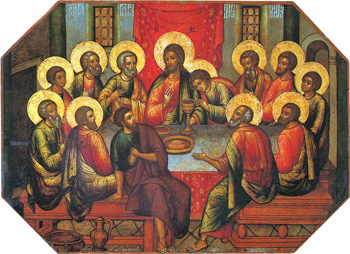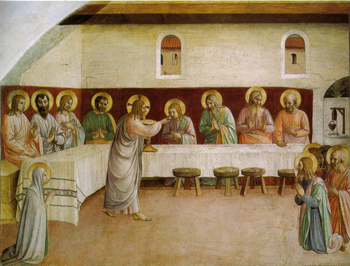For Sunday August 28th, 2016
Lectionary Readings (Revised Common Lectionary, Year C)
Luke 14:1, 7-14
Jeremiah 2:4-13
Psalm 81:1, 10-16
Hebrews 13:1-16
This week's Gospel reading reminds me of a story my father tells about his early childhood in rural India. My grandparents were devoted members of their church, and it was often the case that elders and preachers spontaneously showed up at their home for lunch after Sunday services. Food wasn't always plentiful in those years, and cooking rice and curry over a wood stove took time. Because the rules of hospitality dictated that "men of God" eat first, my father and his siblings had to wait quite a while to eat on Sundays. Only when the honored guests had had their fill and left would my grandmother gather the leftovers and feed the kids.
My father — being only four years old at the time — did not find this weekly arrangement pleasing. One Sunday afternoon when he was feeling especially hungry, and my grandmother had already chased him out of the kitchen a dozen times, he just plain lost it. Marching into the dining room where the guests were relishing their second helpings, my father stuck his little hands to his hips and yelled, "Get out! Hurry up and leave so I can eat!"
I think Jesus would have relished this story, because he wasn't known for his politeness around food, either. Though the Gospels record him receiving and accepting many dinner invitations during the years of his ministry, those mealtime scenes usually ended in drama, provocation, or scandal. Once, a woman of dubious reputation caressed his feet under the table. Sometimes he interrupted a meal to heal sick people on the Sabbath. Often, he ate with dirty hands, shared a table with riff-raff, and drank more than his enemies considered respectable. Worst of all — he said things. Blunt, embarrassing things that no one cared to hear.
| |
This week's lectionary reading from the Gospel of Luke describes such a scene. Jesus is invited for a Sabbath meal by a leader of the Pharisees. Arriving early, he sits and watches as his fellow guests scramble for places of honor around the table. Like the elders who showed up at my grandparents' home, these guests know the pecking order, and they relish it. If I'm imagining the scene correctly, they jostle and shove each other, feigning dignity while still fighting for prestigious spots near the host.
After observing their drama for a while, Jesus calls them out with a parable. Knowing full well the social rules of his day, he shuns them and calls instead for a revolution. Not a revolution of arms and bloodshed, but a revolution in table manners.
"When you are invited by someone to a wedding banquet, do not sit down at the place of honor," he exhorts his fellow guests. "Go and sit down at the lowest place, so that when your host comes, he may say to you, 'Friend, move up higher.'" "For all who exalt themselves will be humbled, and those who humble themselves will be exalted."
As if that isn't counter-cultural enough, Jesus turns to his host and continues: "When you give a luncheon or dinner, do not invite your friends or your brothers or your relatives or rich neighbors, in case they may invite you in return, and you would be repaid. But when you give a banquet, invite the poor, the crippled, the lame, and the blind. Then you will be blessed, because they cannot repay you."
Our lection this week doesn't tell us how Jesus's listeners reacted. I don't know if they laughed, shook their heads in disbelief, questioned Jesus's sanity, argued back, or followed his advice. All I know is how I react as I read and re-read this story. I feel an uncomfortable combination of surprise, skepticism, and fear. As in: Really? Is Jesus serious? Does he have any idea what he's asking?
 |
It appears he does. Every once in a while, just as I'm growing comfortable with my faith, a story like this one comes along to shatter my complacency. Don't exalt myself? Don't insist on the recognition I deserve? Ignore the pecking order — or worse — upend it? Don't network, don't schmooze, don't brown nose? Open my heart and home to people who can do nothing for me? People I have no affinity for? People I can't impress, earn favors from, or show off to my competition?
Why on earth should I do that?
Because Jesus insists on it. Because this is who God is, the Great Reverser of our priorities, our hierarchies, and our values. Because there is no end to the game of who is "in" and who is "out," and God in his wisdom knows that our anxious scramble for greatness will lead to nothing but more anxiety, more suspicion, more loneliness, more hatred, and more devastation. Because God's kingdom is not a kingdom of scarcity; it is one of abundance, where all are already welcome, already loved, already cherished. Because the currency of that kingdom is humility, not arrogance; generosity, not stinginess; hospitality, not fear.
But let's face it: humility is a tricky thing. We too easily conflate it with self-effacement, low self-esteem, and complicity in the face of oppression. Even if we manage to define it in healthy ways, humility betrays us; the very instant at which I claim to achieve humility is the moment when it eludes me. Worse, very little in our culture rewards or supports the humble. Whether we're talking entertainment, politics, sports, or even religion, we in Western cultures have an unhealthy admiration for the loudest, the biggest, and the greatest. Whether we recognize it or not, we are known around the world for idolizing the superlative. What would happen to our discourse if we shunned the word "best?"
When we dare to gather at Jesus's table, we are activitely protesting the culture of upward mobility and competitiveness that surrounds us. There's nothing easy or straightforward about this; it requires hard work over a long period of time. To eat and drink with God is to live in tension with the pecking orders that define our boardrooms, our college admissions committees, our church politics, and our Presidential elections, and that can be tiring. But it's what we're called to do — to humble ourselves and place our hope in a radically different kingdom.
 |
Whenever my father retells his childhood story, I tell him that Jesus applauded that ravenous little four-year-old who broke the rules and challenged the hierarchy. In fact, if I'm reading Luke's story correctly, I believe Jesus would have ushered those men of God right out of the room, and insisted that the little children eat first. Favor the ones who cannot repay you. Prefer the poor. Choose obscurity.
Jesus asks us to believe that our behavior at the table matters — because it does. Where we sit speaks volumes, and the people whom we choose to welcome reveals the stuff of our souls. This is God's world we live in; nothing here is ordinary. In this realm, the strangers at our doorstep are the angels.
Image credits: (1) Wikipedia.org; (2) Wikipedia.org; and (3) Wikipedia.org.





